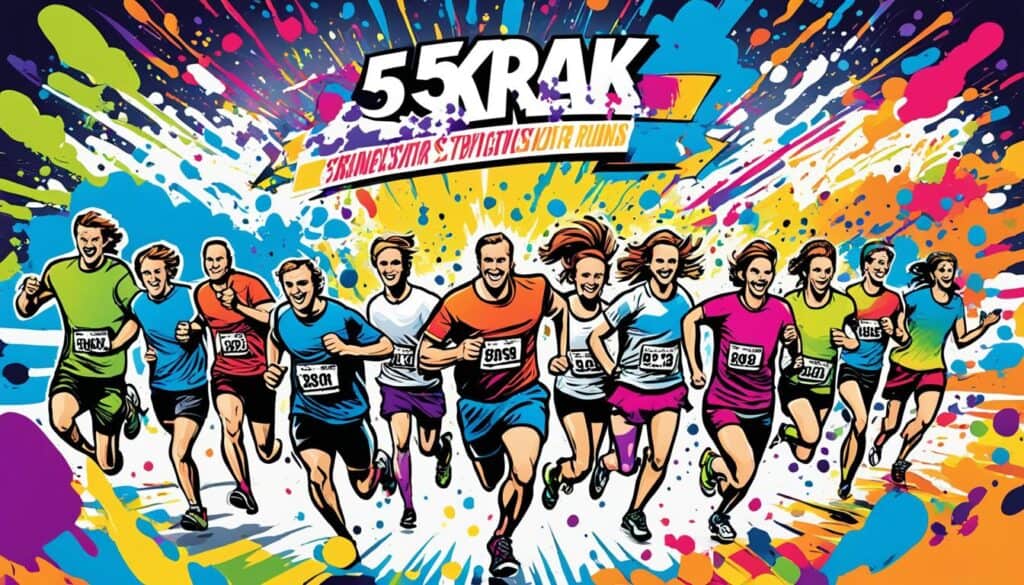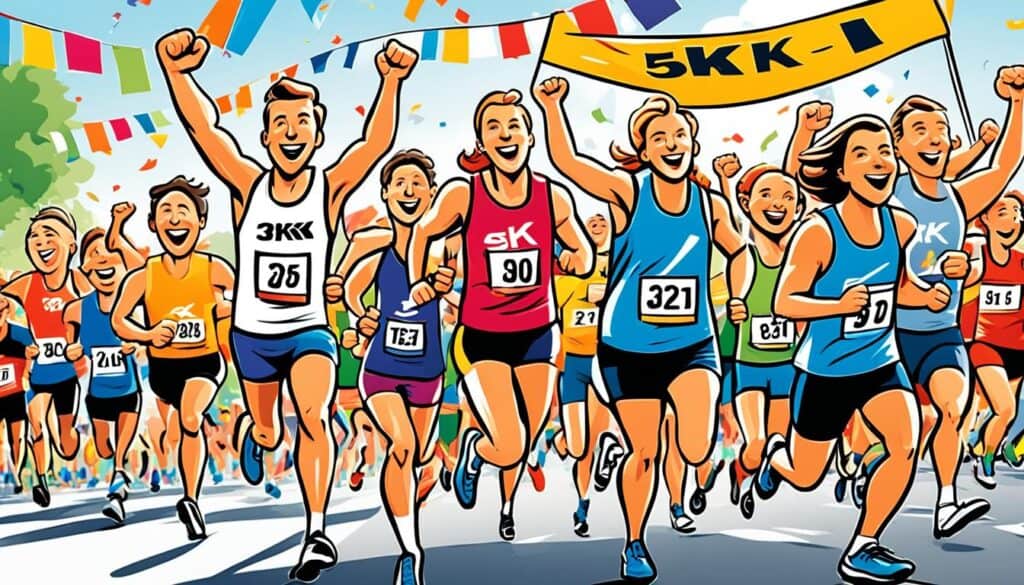Did you know that a 5K is equivalent to 3.1 miles? That’s right, the ‘K’ in 5K stands for kilometers, but when it comes to converting to miles, it’s approximately 3.1 miles. This surprising fact highlights the importance of understanding the distance when embarking on a 5K race or training program.
Whether you’re a seasoned runner or just starting your fitness journey, knowing the 5K distance in miles can help you set goals, track progress, and plan your training effectively. So, if you’re wondering about how long is 5K in miles, how to convert 5K to miles, or simply curious about the 5K race distance in miles, you’ve come to the right place!
Key Takeaways:
- A 5K is equivalent to 3.1 miles.
- The ‘K’ in 5K stands for kilometers, but when converting to miles, it’s approximately 3.1 miles.
- Understanding the 5K distance in miles is essential for setting goals and tracking progress in races and training.
- Knowing the 5K distance in miles can help you plan your training effectively.
Average time for a 5K
When it comes to running a 5K, the average time can vary depending on various factors including fitness level and training. On average, men complete a 5K race in approximately 22 minutes and 31 seconds, while women finish in around 26 minutes and 7 seconds. However, these times are just averages, and individual performances can differ significantly.
The typical 5K finish time is influenced by several factors. Those who are more experienced and have been training consistently may achieve faster times, while beginners or individuals who have just started running might take longer to complete the distance.
It’s important to note that the average pace for a 5K can also vary based on personal goals and abilities. Some runners may aim for a faster pace, aiming to complete the race in under 20 minutes, while others may take a more leisurely approach to enjoy the experience, regardless of the time taken.
It’s crucial to remember that everyone’s journey in running is unique, and what matters most is setting personal goals, making progress, and enjoying the sport.
“Running teaches us to keep moving forward, no matter how slow or fast we go.”
– Unknown
Why you should run a 5K
Running a 5K can be a life-changing experience for many reasons. Not only is it a distance that is accessible to most people, regardless of their fitness level, but participating in a 5K also offers a myriad of benefits for both your physical and mental well-being.
1. Kickstart a healthy lifestyle: Running a 5K race can serve as a catalyst for adopting a healthier lifestyle. Training for and completing a 5K provides a tangible goal to work towards, encouraging regular exercise and improved fitness habits.
2. Improve cardiovascular health: Regular participation in a 5K can have substantial cardiovascular benefits. Running helps to strengthen the heart, increase lung capacity, and improve blood circulation, leading to a healthier heart and reduced risk of cardiovascular diseases.
3. Boost self-confidence: Crossing the finish line of a 5K race can be an empowering experience. Setting a goal and achieving it not only improves self-esteem but also instills a sense of accomplishment and pride in oneself.
4. Connect with other runners: Participating in a 5K race provides an opportunity to meet and connect with like-minded individuals within the running community. Sharing the experience with others can create a sense of camaraderie and foster new friendships.
“Running allows me to clear my mind and find my inner peace. Participating in 5K races has introduced me to a community of passionate individuals who inspire and support each other every step of the way.”
Join the 5K revolution
Are you ready to experience the numerous benefits of running a 5K for yourself? Lace up your running shoes, set your sights on the finish line, and join the 5K revolution! No matter your age or current fitness level, the 5K distance is an achievable goal that can transform both your physical and mental well-being.
Next, let’s explore the different types of 5K races that cater to various preferences and goals.
Types of 5K races
When it comes to 5K races, there are numerous options available, each offering a unique experience tailored to different preferences and goals. Whether you’re looking for a fun-run event, a chance to support a charity, a competitive race to challenge yourself, or a themed race for added excitement, there is a 5K race out there for everyone.
Fun-Run Events
Fun-run events are a popular choice among participants who want to enjoy the experience of a 5K race while having a good time. These races often have a relaxed atmosphere and encourage participants to dress up in costumes or wear fun accessories. They are perfect for runners of all levels who want to add an element of amusement to their race day.
Charity Runs
Charity runs provide an opportunity for runners to combine their love for running with supporting a cause they are passionate about. These races are organized to raise funds and awareness for various charitable organizations. By participating in a charity run, runners can make a positive impact on their community while achieving their fitness goals.
Competitive 5K Races
For those looking to test their limits and push themselves to new heights, competitive 5K races offer a challenging environment. These races attract competitive runners who are focused on achieving their personal best and competing against other talented athletes. The competitive atmosphere and fast-paced nature of these races provide an exhilarating experience for participants.
Themed 5K Races
Themed 5K races add an extra element of excitement and entertainment to the event. Participants get to run amidst a vibrant and festive atmosphere, often dressing up according to the theme. These races are perfect for individuals who enjoy a unique and memorable race experience.

Image: Themed 5K races add an element of fun and excitement to the event.
Conclusion
Running a 5K is an exciting and accessible challenge for individuals of all fitness levels. With a distance equivalent to 3.1 miles, participating in a 5K can be a great way to kickstart a healthy and active lifestyle.
Not only does running a 5K provide physical benefits such as improved cardiovascular health and increased endurance, but it also offers numerous mental advantages. Setting a goal to complete a 5K can boost self-confidence and provide a sense of accomplishment.
There are various types of 5K races to choose from, including fun-run events, charity runs, and competitive races. These races offer opportunities to connect with like-minded individuals, support meaningful causes, and challenge oneself.
Whether you are a beginner or a seasoned runner, training for a 5K can be a rewarding journey. It allows you to push your limits, set personal records, and experience the thrill of crossing that finish line. So lace up your running shoes, start training, and embark on the exhilarating world of 5K races!

